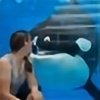HOME | DD
 Shippochan1000 — Morgan with baby Ula
Shippochan1000 — Morgan with baby Ula

#calf #delfin #delphin #dolphin #loropark #marinemammal #orca #orcacalf #orcinus #orcinusorca #teneriffa #wal #zoo #loroparque #schwertwal #babyorca #großerschwertwal #killerwhale #morgan #tenerife #ula #zoophotography
Published: 2019-12-15 14:15:50 +0000 UTC; Views: 822; Favourites: 12; Downloads: 0
Redirect to original
Description
12 year old Morgan with her 1 year old calf Ula.
Orca/ Orcinus orca / Großer Schwertwal Loro Parque
Finally i had the chance to visit loro parque and see morgan with her calf. They are a lot of lies all over the internet about Ula. But i wanted to see for my own if they are true and came to the conclusion they are not true. I am an animal care specialist and worked with a wide taxa including marine mammals. I think i am a bit mor of an expert then this so called orca specialists that just watched a few extremely biased movies full of manipulations and lies like Blackfish. I did spend a lot of time watching the orcas, about half the day. Ula was looking healthy, even her pectoral fins were looking normal. She did spent a lot of time with her mother and Adan playing. For her bottle she was briefly seperatet from Morgan, but not more than a few minutes. During midday and afternoon she was together with the whole pod in all pools even with her father Keto. She even tagged along her mother during a presentation. During the whole day i saw a lot of positive social behavior, parallel swimming and playing. All of the animals were in good shape, despite animal right activist claiming the trainers would starve the orcas to perform. The training method the trainers at loro Parque use are all positive reinforcement.
Related content
Comments: 15

So glad to know she is continuing to do well and is interacting with the whole pod! Yay!
👍: 0 ⏩: 0

👍: 1 ⏩: 1

It always hurts me when they spreading lies. If they would stick to the truth i would not object but this makes me angry. All people working in animal care at acreditet facilities live for the animals they care for, they are like family and get treated like such.
I was so happy seeing Ula and morgen happy together. During the presentation when Ula tried to imitate her mother and Adan my heart melted.
👍: 2 ⏩: 0

I love Loro Parque and these two girls. Really wish I could go to Tenerife to visit them someday.
👍: 0 ⏩: 1

I hope you can visit them someday^^
👍: 0 ⏩: 0

Blackfish isnt full of lies, it´s has lots of thruths
I know orcas and have studied them for a long while now, and being in captivity isnt good at all for them
👍: 0 ⏩: 1

Which zoological degree do you have and where did you study orcas?
Blackfish has a few truth but a lot of interviews were completely thrown out of context an and divided into parts and then put back together diffrently. With this they made positiv interviews into something negativ. A real documentary would not do this and show both sides truthfully.
Orcas in captivity which live in scientifically managed facilities like loro Parque do quite well. They show natural behavior and breed naturally. Orcas don't breed if not feeling well. The stress levels of the orcas at loro parque are similar in some cases even lower than of orcas in the wild which was proven by independent marine biologists. Over the last few years loro parque spent over 19 million dollar to help animals in their natural habitat including endangered orca populations like the one in the street of gibraltar.
👍: 0 ⏩: 2

First of, you dont need a degree to know if captivity is good or not for an orca. However I have books and documentaries that have a lot of information that talk about their life in the wild and why its better
1- orcas live longer in the wild, males get to live 60 - 65 years old while females live 90 years. In captivity they just live half of those years, at best.
2 - its not healthy for females to get pregnant at age 12 or 14, the organism of a female orca is mature at age 17, if pregnant at 12 orcas have the same risks of miscarrige or possible death during or before giving birth
3 - orcas in both the wild and captivity eat around 500 to 1200 kilos of food, but orcas in the wild have a better diet since they eat: seals, sharks, penguins, dolphins, whales, squid, octopus and turtles wich, increases their stamina and years of life, something orcas in captivity don't have.
4 - orcas in captivity suffer great levels of stress because they dont get to swim great distances, they don't have the chance to learn, improve or even come up with hunting techniques, sure they learn tricks but that's not the same. Not to mention that orcas that live in captivity have to share space with orcas from other parts of the world and their communication doesn't allow them to get along, why? Every pod has their own language and it becomes impossible to try to talk to someone who doesn't undwrstandunderstand you
5 - orcas at captivity have terrible health, orcas often have injuries from fights with other orcas wich leads to strokes, heart failure and inner bleeding, something that orcas on the wild do not suffer a lot. Also, sometimes orcas in captivity get infections from their teeth regardless if vets do something so they don't chew parts of the tank or from chewing from the tank itself
6 - mental health on wild orcas are like those of humans that live a normal life, with their ups and downs but always normal and ordinary, mental health in orcas in captivity are similar to the one of kidnap victims, they feel depressed, anxious, desperate and looking ways to escape or get normality in their lives.
We are talking of an animal that has 20% brain capacity, ten percent more than humans wich makes them more sensitive and vulnerable to the mental trauma of being captive. If you were living like an orca in captivity would you like it?
👍: 0 ⏩: 1

I agree with you, people have different opinions and that is alright. However i have a lot of literature and scientific studies from independent experts who are not tied to the animal right industry or Loro Parque/Seaworld in any way. They were made with wild orca populations around the world and state completely different facts
1. The Average life span for males is 30 years and for females 50 years. For the females in captivity there is room to improve, but most of the recent deaths a seaworld are rooting back into illnesses that were caused in the past when they did not know how to care for them properly, but time has changed. Take the bottlenose dolphin for example: 2 decades ago most of them were dying earlier than their wild counterparts (average lifespan for wild bottlenose dolphins is 19 Years). Nowadays most of them outlive their wild counterparts by decades. With orcas it will be the same.
In the 12 years loro Parque keeps orcas just 1 had died. It was a young calf. Orca calf mortality in the wild range from 50%-90% depending on population.
2. Most females in the wild mature at around 10-12 Years and get the first calf between 11 and 14 years. As always the are some exceptions, rarely the mature earlier than that or later. Miscarriage can happen in captivity and in the wild. Females of the population at the coast of seattle for example are known to have miscarriage about 90% of all detected pregnancies.
3. If you know so much about orcas you would know that most are specialized on a type of food. Some pods Hunt seals, whales or sharks, some hunt nearly exclusively fish. It does not matter what type an orca eats as long as it has all the things ( fat, protein, calories, minerals and vitamins) in the right amount. The orcas at loro parque get a wide varity of fish and squid which is restaurant quality and MSC certificated. As I stated above all orcas that have a healthy weight.
4. I stated before that the orcas at loro parque have lower stress levels that wild orcas. Thats a fact proven by independent studies. Orcas do not swim this long distances for fun, they need to do that to survive. If an orca finds everything it needs ( a mate, food) it will stay there till the food source perished and will then move on. All orcas at loro parque are born in captivity and you can clearly hear them speak to each other. The only one not doing that is Morgan because she is deaf. Also you tell me how intelligent they are, they can learn sign language, dont you think they can learn other orca language the too.
5. That's not proven, both orcas in the wild or captivity get sick, thats normal. Its not known how many die out there, most of the time you don't find the bodies and just a smal fracture of wild orcas are permanetly observed. Rake marks are normal, in fact if a researcher finds a wild orca who does not have them they do worry about it because it means that this individual has no social contact to other orcas. Arguing is also normal. We humans do it too. I also did see plenty of pictures of wild orcas, washed ashore with teeth worn down to the gum. There is also an interesting study to that theme.
6. Also not proven. The only thing proven is that both show the same behavior.
Its true that dolphins in general have a bigger brain capacity but that does not mean the are more sensitiv to something lika that. in fact there are most likely quite a few animals who surpass humans in brain capacity. There is just not enough research done. A pig for example is as intelligent as a human. But you cant compare a human, dolphin or pig. They all developed different, they use their brain differently, feeling emotions in a different way.
By the way, our oceans are dying. Orca numbers drop rapidly because of us humans. Overfishing, pollution, climate change and noise pollution are killing the whole ecosystem. Loro parque at least slaps the horrible truth in their visitors face, demanding change.
Irresponsible whale watching is also disturbing them. Orcas leave their home territory and stop hunting because of this.
And yes i would to be against living like that with free health insurance, all ne food i need a patner and friends.
👍: 0 ⏩: 2

👍: 0 ⏩: 0

Still, captivity doesnt beat the wild
👍: 0 ⏩: 0

I am not a zoological researcher with a degree, but from what many other highly qualified researchers say I know that the care for those animals is the best, of course, they are worth millions for the facilities in which they are held, and a lot of the trainers truly care for them. However, the size of tanks in which they are held is nowhere close to being sufficient to what they truly need and the distances they swim in the wild, which makes them bored and their fins drop during to spending so much time out of the water when looking for trainers.
In the wild there have been no events of orca deadly attacks to humans, while in captivity there have been many, I suppose that should mean something. Due to the small size of their cage, and a few forced interactions, those animals can become highly stressed. It does not mean they are always stressed, especially baby orcas are probably never stressed, but there are events in which stress occur and it is both harmful for the orcas and the humans who interact with them. In the wild, stress is not caused by the space which they are confined to, however, it is often caused by hunger while they look for food, but that is an absolutely normal form of stress which orcas have dealt with for millions of years and to which they are built to handle.
👍: 0 ⏩: 1



















